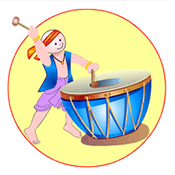
Dimdima
Online Children's Magazine from India

Dimdima
Online Children's Magazine from India
| An Old Man's Dream |
|
|
When it appeared that no Indian leader would stand by Hume in
his hour of crisis, support came from Bal Gangadhar Tilak. Writing in the
Mahratta, Tilak described the Bombay Standing Committee's action to disown
Hume's letter as hasty and showing a lack of courage.
"Whatever we may think of Mr. Hume and his circular," Tilak concluded, "nothing
will induce the Congress Party to disown a man, who is justly regarded as the
Father of the Indian National Congress."
In 1894, Hume bade farewell to India and left for England. In the farewell
speech he gave in Bombay Hume said: "Let nothing discourage you... many years
may pass during which apparently you gain no single inch...may... even lose
ground... but...work on ceaselessly, and India shall one day reap a glorious
harvest of your labours... hammer, hammer, hammer—never relaxing your
efforts...you can work at high pressure for a week, but to run at low pressure,
uniformly and unwearyingly for a year... is the very first requisite for
political success."
Hume continued to work relentlessly for India's cause in England until his death
in 1912.
| ||
Dimdima is the Sanskrit word for ‘drumbeat’. In olden days, victory in battle was heralded by the beat of drums or any important news to be conveyed to the people used to be accompanied with drumbeats.
Bharatiya Vidya Bhavan
K. M Munshi Marg,
Chowpatty, Mumbai - 400 007
email : editor@dimdima.com
Bharatiya Vidya Bhavan
505, Sane Guruji Marg,
Tardeo, Mumbai - 400 034
email : promo@dimdima.com
Dimdima.com, the Children's Website of Bharatiya Vidya Bhavan launched in 2000 and came out with a Printed version of Dimdima Magazine in 2004. At present the Printed Version have more than 35,000 subscribers from India and Abroad.